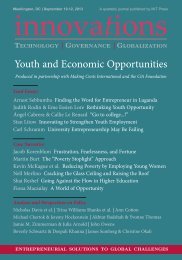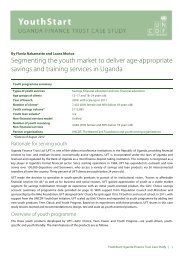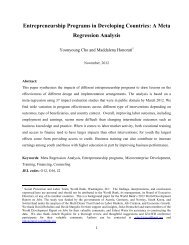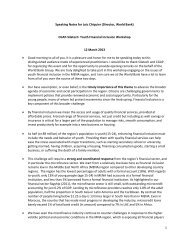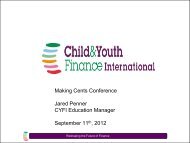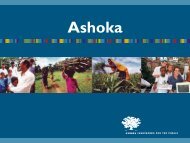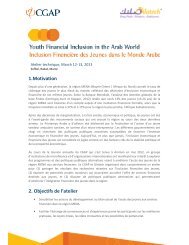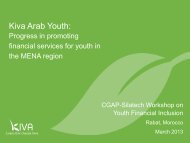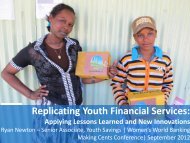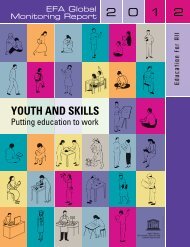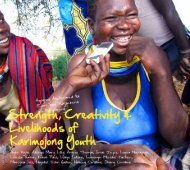Download - Youth Economic Opportunities
Download - Youth Economic Opportunities
Download - Youth Economic Opportunities
You also want an ePaper? Increase the reach of your titles
YUMPU automatically turns print PDFs into web optimized ePapers that Google loves.
Who Teaches Us Most About Financial Programing in Africa<br />
by generating, controlling, and managing money, and they therefore had the<br />
potential to be strong teachers with valuable experience in financial literacy.<br />
Data gathering and analysis provided strong evidence of the efficacy of the<br />
existing programs, but we knew that the program had to evolve further to achieve<br />
wealth and employment by creating businesses in the rural context. The UK<br />
Department for International Development supported a Financial Education<br />
Program, while The MasterCard Foundation increased its support beyond girls’<br />
secondary and tertiary education to fund a new business program, the Innovation<br />
Bursary Program.<br />
THE INNOVATION BURSARY PROGRAM<br />
At its inception, the Innovation Bursary Program (IBP) was designed to introduce<br />
new knowledge and business ideas to individuals who had a good standard of academic<br />
performance (though were not necessarily academic highfliers), and who<br />
had personality traits that pointed to an ability to innovate and lead, such as confidence,<br />
curiosity, and strong communications skills. To date, 30 young women<br />
have completed the IBP, and 28 more have been selected for the third cohort.<br />
The program was envisaged as a development prototype with the potential to<br />
accelerate systemic change in rural Africa. The design has been fine-tuned over the<br />
last two years, but the fundamentals have proven resilient and remained constant,<br />
relying on these mutually reinforcing initiatives:<br />
The provision of technical skill-building and exposure to new business practices<br />
and ideas through group and individually tailored training, internships, and<br />
mentoring<br />
Assistance in brokering relationships between young women entrepreneurs and<br />
microfinance institutions<br />
Training and the development of market research to test the viability of business<br />
ideas in the rural economy<br />
Peer support among a year group and between successive year groups<br />
Engagement and oversight of Camfed directors in-country and internationally<br />
Two years of action and analysis have provided some important insights. First,<br />
we have refined the criteria for the selection of candidates to give equal weight to<br />
their personal achievements and qualities on the one hand, and to their commitment<br />
to their business idea on the other. The second generation of participants<br />
seems to be even more determined and outward-looking than its predecessors.<br />
Second, the selection of internships evolved because by the second year more businesses<br />
were interested in participating. At that point, compatibility between the<br />
IBP participant and the business was assessed at sessions in which businesses<br />
pitched their opportunity, thus tipping the balance of choice in favor of the participant.<br />
Third, the mentors are proving invaluable; their engagement goes well<br />
beyond the anticipated time commitment and is sustained by the readiness of<br />
mentees to listen, learn, and act on advice. Fourth, family support is increasingly<br />
important. When family members provide moral, financial, and other types of<br />
innovations / 2013 Global <strong>Youth</strong> <strong>Economic</strong> <strong>Opportunities</strong> Conference 237



